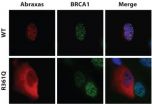Restoring reality: Training improves brain activation and behavior in schizophrenia
2012-02-23
(Press-News.org) A pioneering new study finds that a specific type of computerized cognitive training can lead to significant neural and behavioral improvements in individuals with schizophrenia. The research, published by Cell Press in the February 23 issue of the journal Neuron, reveals that 16 weeks of intensive cognitive training is also associated with improved social functioning several months later and may have far-reaching implications for improving the quality of life for patients suffering from neuropsychiatric illness.
Schizophrenia is a debilitating psychiatric illness that is associated with severe clinical symptoms, such as hallucinations and delusions, as well as substantial social and cognitive deficits. "Schizophrenia patients struggle with 'reality monitoring,' the ability to separate the inner world from the outer reality," states senior author, Dr. Sophia Vinogradov. "Although there are drugs that reduce the clinical symptoms of schizophrenia, current medications do not improve cognitive deficits. In addition, conventional psychotherapy has not proven to be successful, and there is a pressing need for new therapeutic strategies."
In the current study, scientists from the University of California, San Francisco, took a unique approach to enhancing behavior and brain activation in individuals with schizophrenia. "We predicted that in order to improve complex cognitive functions in neuropsychiatric illness, we must initially target impairments in lower-level perceptual processes, as well as higher-order working memory and social cognitive processes," explains senior study author, Dr. Srikantan Nagarajan.
The first author, Dr. Karuna Subramaniam, who conducted the study and analyzed the data, found that when compared with pretraining assessments, schizophrenia patients who received 80 hours of computerized training (over 16 weeks) exhibited improvements in their ability to perform complex reality-monitoring tasks, which were associated with increased activation of the medial prefrontal cortex (mPFC). The mPFC is a critical brain region that supports successful reality-monitoring processes. "We found that the level of mPFC activation was also linked with better social functioning six months after training," says Dr. Subramaniam. "In contrast, patients in a control group who played computer games for 80 hours did not show any improvements, demonstrating that the behavioral and neural improvements were specific to the computerized training patient group."
"Our study is the first to demonstrate that neuroscience-informed cognitive training can lead to more 'normal' brain-behavior associations in patients with schizophrenia, which in turn predict better social functioning months later," concludes Dr. Vinogradov. "These findings raise the exciting likelihood that the neural impairments in schizophrenia—and undoubtedly other neuropsychiatric illnesses—are not immutably fixed, but instead may be amenable to well-designed interventions that target restoration of neural system functioning."
INFORMATION: END
ELSE PRESS RELEASES FROM THIS DATE:
2012-02-23
What: NIH-supported scientists will be presenting their latest research findings at the 2012 Midwinter Meeting of the Association for Research in Otolaryngology (ARO).
When: February 25-29, 2012
Where: The Manchester Grand Hyatt Hotel, San Diego, California, USA
Additional Information: Research topics to be presented by NIDCD-funded scientists will include:
Bilateral ≠ Binaural: Can the Ability to Localize Sounds Be Regained After Bilateral Cochlear Implantation?
Ruth Litovsky, Ph.D., University of Wisconsin-Madison
Bilateral cochlear implants—one implant ...
2012-02-23
PHILADELPHIA - The infamous BRCA genes do not act alone in causing cancer; there is a molecular syndicate at work preventing the way cells normally repair breaks in DNA that is at the root of breast cancer. But finding all of the BRCA molecular collaborators has been elusive.
Researchers at the Perelman School of Medicine at the University of Pennsylvania and the University of Oulu, Finland, published their discovery of a mutation in the Abraxas gene, which interacts with the well-known breast-cancer gene BRCA1, in Science Translational Medicine this week.
The mutation ...
2012-02-23
STANFORD, Calif. — When aortic walls buckle, the body's main blood pipe forms an ever-growing bulge. To thwart a deadly rupture, a team of Stanford University School of Medicine researchers has found two tiny molecules that may be able to orchestrate an aortic defense.
A team led by cardiovascular scientists Philip Tsao, PhD, and Joshua Spin, MD, PhD, identified two microRNAs — small molecules that usually block proteins from being made — that work to strengthen the aorta during bulge growth. By tweaking the activity of each molecule, they could reduce abdominal aortic ...
2012-02-23
Recently, the National Transportation Safety Board (NTSB) called for every state in the nation and Washington, D.C., to ban all non-emergency cellphone use while driving a motor vehicle. This recommendation follows various studies that have concluded cellphone use while driving can be extremely distracting - often leading to severe or even deadly accidents.
One tragic trucking accident illustrating the NTSB's concerns was an accident in which a truck driver, while using his cellphone, crossed the median and hit a van, killing 11 people in the process. It remains to be ...
2012-02-23
Two independent groups of researchers — one led by Adrian Clark, at Queen Mary University of London, United Kingdom; and the other led by Jean-Laurent Casanova, at The Rockefeller University, New York — have now identified the disease-causing gene in patients with a complex inherited syndrome most commonly observed in the Irish Traveller community. As noted by Jordan Orange, at the University of Pennsylvania School of Medicine, Philadelphia, in an accompanying commentary, the new data provide deep mechanistic insight into a complex human condition and expand our understanding ...
2012-02-23
Children with Down syndrome (DS) have an increased risk of developing leukemia, in particular acute megakaryoblastic leukemia (AMKL) and acute lymphoblastic leukemia (ALL). Through their studies in a mouse model of DS, a team of researchers led by John Crispino, at Northwestern University, Chicago, has now identified a potential explanation as to why children with DS are at increased risk of AMKL. In doing so, they have also identified a candidate therapeutic target.
DS is a genetic condition in which a person has an extra copy of chromosome 21 (they have 3 copies rather ...
2012-02-23
EDITOR'S PICK: Unraveling why children with Down syndrome have increased leukemia risk
Children with Down syndrome (DS) have an increased risk of developing leukemia, in particular acute megakaryoblastic leukemia (AMKL) and acute lymphoblastic leukemia (ALL). Through their studies in a mouse model of DS, a team of researchers led by John Crispino, at Northwestern University, Chicago, has now identified a potential explanation as to why children with DS are at increased risk of AMKL. In doing so, they have also identified a candidate therapeutic target.
DS is a genetic ...
2012-02-23
Researchers from UCLA's Jonsson Comprehensive Cancer Center, together with scientists from 12 other sites in the United States and Australia, report for the first time that a newly approved drug for patients with metastatic melanoma nearly doubles median survival times, a finding that will change the way this deadly form of skin cancer is treated.
The data comes from an international Phase II study of Zelboraf that included 132 patients followed for at least one year.
Patients with this advanced form of melanoma that has spread to other organs typically survive about ...
2012-02-23
The Virginia Tech – Wake Forest University School of Biomedical Engineering and Sciences (SBES) announces the first ever publication with data on head impacts from youth football players. The paper is published in the Annals of Biomedical Engineering and is available online for free download. The manuscript includes the details of over 700 head impacts measured on 7 and 8 year old youth football players.
Based on the importance of this initial publication, the School of Biomedical Engineering and Sciences is also announcing today a new study to instrument and map the ...
2012-02-23
Nursing homes are supposed to provide quality care, but recent studies raise concerns that some of these homes put our elderly population at increased risk of injury and death. The studies, conducted by both the Government Accountability Office and Health Services Research, found well-known nursing home chains often violate federal regulations in ways that can lead to increased risk of nursing home injuries.
Connection Between For-Profit Facilities and Poor Care
The Government Accountability Office published a study in July of 2011, reviewing complaints that for-profit ...
LAST 30 PRESS RELEASES:
[Press-News.org] Restoring reality: Training improves brain activation and behavior in schizophrenia

